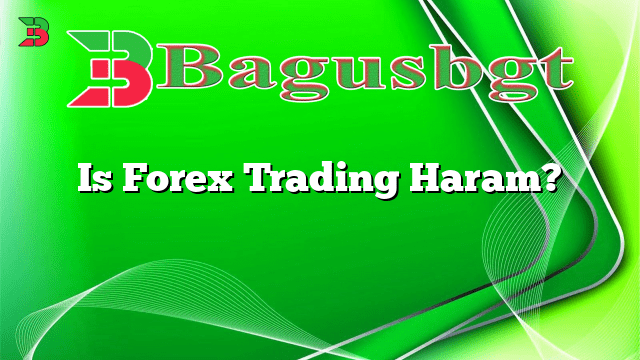Hello, dear readers. Today, we will delve into the controversial topic of whether forex trading is considered haram or forbidden in Islam. As the popularity of forex trading continues to grow, it is crucial to understand the religious implications it may have. In this article, we will explore the concept of forex trading in the context of Islamic principles and shed light on the debate surrounding its permissibility.
Understanding Forex Trading
Forex trading, also known as foreign exchange trading, involves the buying and selling of currencies in the global market. Traders aim to profit from the fluctuations in exchange rates between different currencies. The forex market operates 24 hours a day, allowing participants to trade currencies at any time.
The Debate on Permissibility
The question of whether forex trading is haram arises due to the involvement of several factors that are considered problematic from an Islamic perspective. These factors include:
1. Riba (Interest)
In Islamic finance, riba refers to the charging or paying of interest. Since forex trading often involves the use of leverage, which entails borrowing funds from a broker, the interest rates associated with these loans can be seen as riba. This aspect raises concerns among scholars who argue that any form of transaction involving interest is prohibited in Islam.
2. Uncertainty and Speculation
Forex trading involves speculation on the future price movements of currencies. This uncertainty and speculation can be seen as akin to gambling, another activity that is strictly prohibited in Islam. Critics argue that forex trading is a form of gambling, as traders are making bets on the direction of currency prices without any tangible asset underlying their trades.
3. Gharar (Excessive Uncertainty)
Gharar refers to excessive uncertainty or ambiguity in financial transactions. Forex trading can be seen as embodying gharar due to the unpredictable nature of currency fluctuations. Transactions that involve gharar are generally discouraged in Islamic finance, as they can lead to exploitation and unfairness.
The Permissibility Debate Continues
Islamic scholars have differing opinions on whether forex trading is haram or halal (permissible). While some argue that the involvement of riba, uncertainty, and speculation make it impermissible, others contend that forex trading can be considered halal if certain conditions are met.
Conditions for Permissibility
According to proponents of halal forex trading, the following conditions should be met for it to be considered permissible:
- The trades must be spot trades, where the physical exchange of currencies occurs immediately without any delay or deferral.
- The currencies being traded must be from countries with stable economic conditions and without any political or social unrest.
- The trading activity should not involve excessive leverage or borrowing with interest.
Adhering to these conditions would ensure that forex trading aligns with the principles of Islamic finance and avoids the elements that are considered haram.
Alternative Views
While the majority of Islamic scholars consider forex trading haram, there are alternative views that argue for its permissibility. These alternative views are often based on interpretations that take into account the modern context of forex trading and its potential benefits for individuals and the economy.
Benefits of Forex Trading
Proponents of the permissibility of forex trading highlight its potential benefits, such as:
- Providing individuals with opportunities to diversify their investment portfolios and hedge against currency risk.
- Facilitating international trade and investment, which can contribute to economic growth and development.
- Creating employment opportunities in the financial sector and supporting technological advancements.
These arguments suggest that forex trading, when conducted responsibly and within the bounds of ethical principles, can be beneficial and compatible with Islamic values.
FAQs
| Question | Answer |
|---|---|
| Is forex trading inherently haram? | No, forex trading is not inherently haram. It depends on the specific conditions and practices involved. |
| Can forex trading be considered a form of gambling? | While there are similarities between forex trading and gambling, they are not identical. Forex trading involves analysis, strategy, and risk management, whereas gambling relies purely on chance. |
| What are the alternatives to forex trading for Muslims? | Muslims seeking investment opportunities may consider Sharia-compliant investment funds, real estate investments, or ethical stocks. |
Conclusion
In conclusion, the question of whether forex trading is haram or halal remains a subject of debate among Islamic scholars. While concerns about riba, uncertainty, and speculation exist, alternative views argue for the permissibility of forex trading under certain conditions. It is essential for individuals to seek guidance from knowledgeable scholars and make informed decisions that align with their religious beliefs and ethical principles.



